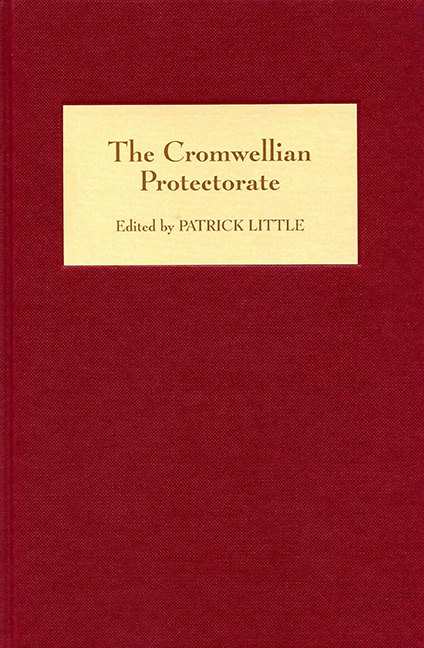Book contents
- Frontmatter
- Contents
- List of Illustrations
- Preface
- Notes on Contributors
- Abbreviations
- 1 Introduction
- 2 Oliver Cromwell and the Protectorate Parliaments
- 3 The Protector Humbled: Richard Cromwell and the Constitution
- 4 Cromwellian Style: The Architectural Trappings of the Protectorate Regime
- 5 Oliver Cromwell and the Council
- 6 ‘To Create a Little World out of Chaos’: The Protectoral Ordinances of 1653–1654 Reconsidered
- 7 The Irish and Scottish Councils and the Dislocation of the Protectoral Union
- 8 ‘This Murmuring and Unthankful Peevish Land’: Wales and the Protectorate
- 9 Cromwellian Towns in the Severn Basin: A Contribution to Cis-Atlantic History?
- 10 Policing the Cromwellian Church: The Activities of the County Ejection Committees, 1654–1659
- Index
1 - Introduction
Published online by Cambridge University Press: 24 October 2017
- Frontmatter
- Contents
- List of Illustrations
- Preface
- Notes on Contributors
- Abbreviations
- 1 Introduction
- 2 Oliver Cromwell and the Protectorate Parliaments
- 3 The Protector Humbled: Richard Cromwell and the Constitution
- 4 Cromwellian Style: The Architectural Trappings of the Protectorate Regime
- 5 Oliver Cromwell and the Council
- 6 ‘To Create a Little World out of Chaos’: The Protectoral Ordinances of 1653–1654 Reconsidered
- 7 The Irish and Scottish Councils and the Dislocation of the Protectoral Union
- 8 ‘This Murmuring and Unthankful Peevish Land’: Wales and the Protectorate
- 9 Cromwellian Towns in the Severn Basin: A Contribution to Cis-Atlantic History?
- 10 Policing the Cromwellian Church: The Activities of the County Ejection Committees, 1654–1659
- Index
Summary
At the symposium on the Cromwellian protectorate held in January 2004, when most of the following chapters first saw the light of day, I was invited to bring the day to an end with a session entitled ‘conclusion’. Almost exactly two years later, I have been asked to begin this book with an ‘introduction’. According to the notes I made at the symposium, I began my ‘conclusion’ on a very up-beat note by saying that ‘my immediate reaction to what I have heard today is one of optimism, since the quality of the papers that have just been read indicates that the state of historical studies of the Cromwellian protectorate is very healthy. Lots of people, young as well as established scholars, are working on the period and are producing exciting new ideas about it. We have had lots of evidence of that today.’ Although since then I have had longer to reflect on (as well as read) those papers, I see no reason not to begin this ‘introduction’ on a similar optimistic note. The new light that these chapters throw on the history of the Cromwellian protectorate is an accurate indicator that the subject is in an excellent state of health.
What is particularly heartening about the current flourishing state of historical studies of the 1650s is that this contrasts with their relatively barren condition during the later part of the twentieth century. I say ‘relatively barren’ in order not to offend those who wrote about the decade in that period, when there were some outstanding contributions to the history of the 1650s. But the amount and quality of writings on the 1650s that was done from the 1970s to the 1990s was much inferior to that that was done on the early seventeenth century including the 1640s. Why that was is, of course, debateable. But in my view the culprit was the ‘revisionist’ trend that dominated British historiography in the 1970s and 1980s. I do not want to use this introduction as a platform from which to mount an onslaught on revisionism. Revisionist history has had some major beneficial effects on the history of the Stuart age, and in the later 1970s and early 1980s I found revisionism very attractive. But revisionism has also had some malign effects, one of which was, I believe, to discourage interest in the 1650s.
- Type
- Chapter
- Information
- The Cromwellian Protectorate , pp. 1 - 13Publisher: Boydell & BrewerPrint publication year: 2007

